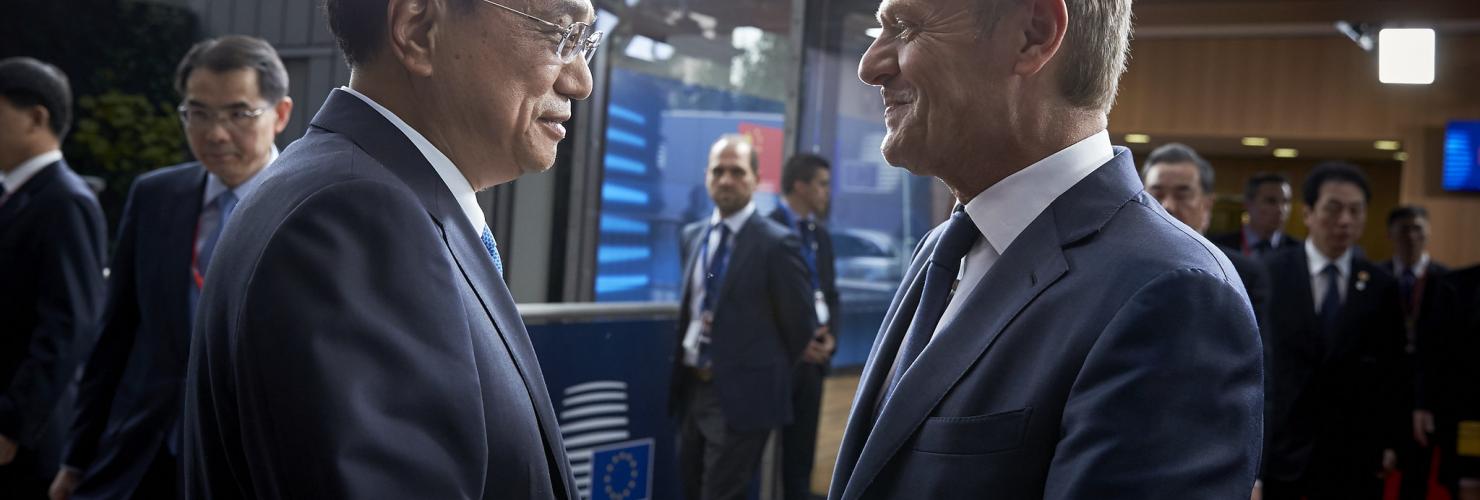

China meets tougher EU at annual summit
When EU and Chinese leaders meet in Brussels next week at their annual summit, the EU needs to present a united front. That looks like a tall order, and it remains to be seen whether the EU will be able to put its relations with China on a more equal and principled footing.
The atmosphere around this year’s EU-China summit is dramatically different from previous years: in a balancing act, the EU has developed a new realism and a much keener awareness of both the opportunities and challenges presented by China. Frustrated with China’s market-distorting practices and predatory technological acquisitions, Brussels wants to push Beijing to curb industrial subsidies, open up its market and commit to signing an ambitious bilateral agreement on investments by 2020.
While the need to rebalance trade and investment relations will top the summit’s agenda, other key issues will also be discussed, including cybersecurity, climate change and potential synergies within the EU-China connectivity platforms. There are also hopes that human rights will not be sidelined again.
But it remains to be seen whether the EU will be able to present a united front and put its relations with China on a more equal and principled footing - both at the summit and, even more importantly, in its aftermath. While the EU arrives better prepared than ever to confront China on key issues, Xi Jinping’s European tour has made abundantly clear that Beijing still profits from the profound divisions that exist between member states.
EU demands set the tone for this year’s summit
With Brexit and a European election looming, the current EU Commission has become more assertive on China. In a remarkably blunt strategy paper published in March, it labelled China “an economic competitor in the pursuit of technological leadership, and a systemic rival promoting alternative models of governance.”
This represents a sea change in the EU’s assessment of China’s – and its own – capabilities. Rather than imitating the US’ zero-sum approach, the paper acknowledges that China is an indispensable partner but also an aspirant leading power which needs to shoulder greater responsibilities.
The ten-point action plan will frame the summit’s discussions, from fair competition, market access and WTO reform to the security of 5G networks – the Commission laid out its recommendations last week. But what is most relevant is that the strategy also focuses on defensive policy changes to strengthen the EU from within, calling for a smarter use of Europe’s industrial, competition, public procurement and trade policy tools to address China’s state-induced economic distortions and boost Europe’s competitiveness.
China wants European integration but benefits from fragmentation
China, on the other hand, maintains an ambivalent position toward Europe. While it wants European integration to access the single market, balance against the US and demonstrate its own commitment to multilateralism, the reality is that Beijing also benefits from EU divisions. Xi’s visit to Italy was a big success for his leadership, as a G7 country endorsed his chief geopolitical initiative, undermining Brussels’ efforts to devise a common European approach to the Belt and Road Initiative (BRI).
Italian populists have already bent to China’s economic clout by abstaining from a vote to introduce an EU-wide investment screening framework aimed at protecting the security of Europe’s critical assets. Italy is not alone. Portugal, for instance, recently warned against European protectionism over Chinese investment. Similar departures from a commonly agreed European line are weakening the bloc.
The EU should expect Beijing to continue cultivating ties with individual member states and accession countries while simultaneously offering assurances and concessions at the EU level. Premier Li Keqiang may have issued an assurance that any trade deal with Washington would not undermine Europe’s interests, and Xi stressed his country’s support of European integration, but Europeans should know by now that they cannot take China’s commitments at face value. The rushed adoption of its new foreign investment law and pledges to curb subsidies to domestic industry resemble symbolic concessions rather than meaningful policy changes.
While Beijing may have downplayed the ‘16+1’ framework – its cooperation format with Central and Eastern European countries – after it was criticized for dividing the EU and failing to deliver on hefty investment promises, there is no indication that its interests in the region have diminished. The fact that Greece will likely be invited to join the summit in Croatia on April 11-13 suggests that the ‘16+1’ may not be dead just yet.
Europe needs a European-wide China strategy that lives up to its name
Given the current state of play, the EU must focus now on translating its newly found assertiveness into action. This will require a Europeanization of its China strategy well beyond Paris and Berlin. Emmanuel Macron’s invitation to Angela Merkel and Jean-Claude Juncker to join him for his recent meeting with Xi will have sent a strong message to Beijing, but it is not enough for larger member states to show a united front in the absence of an EU-wide concert.
Chinese state media continue to highlight the opportunities China presents to “marginalized” economies in Southern Europe; France, Germany and the EU Commission must realize that such narratives still have traction. Suggestions such as EU Commissioner Günther Oettinger’s idea of a European veto over any Chinese infrastructure investment in the EU will hardly be well received by sovereigntist governments like Italy’s. Likewise, the Franco-German plan for a European industrial policy, where China is the elephant in the room, fails to acknowledge the sharp divide between different European regions when it comes to innovation and the fourth industrial revolution.
Brussels’ awakening to China’s growing power and influence is a very positive development. But larger member states must get more troubled economies on board. The Commission’s strategy rightly calls for the rapid implementation of financial support instruments for accession and neighboring countries. Beyond the rhetoric, only actions like these can assure a truly European China policy.

